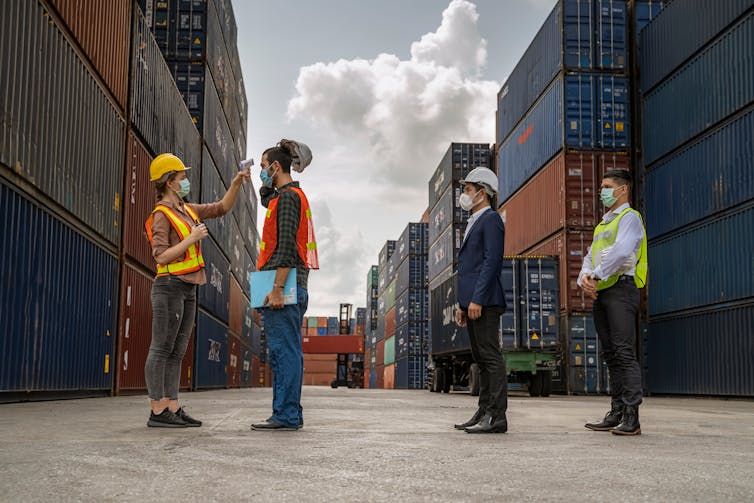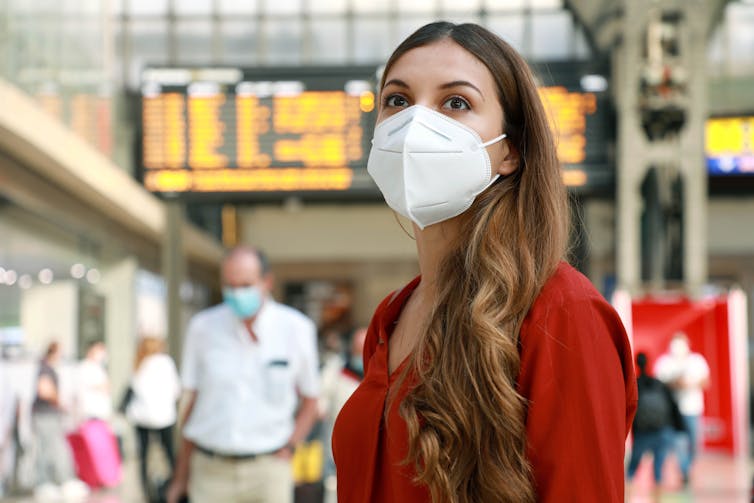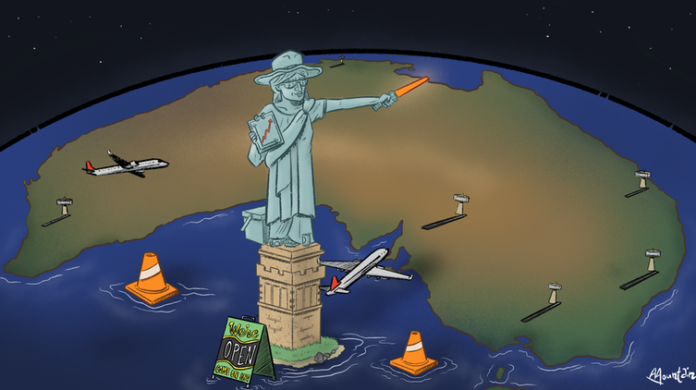By Joellen Riley Munton, University of Technology Sydney
The transition to “living with COVID” makes contracting the virus at work a distinct possibility, even with high vaccination rates.
So what are your rights as an Australian employee if you catch COVID-19, particularly if you believe you have caught it while doing your job?
Employer’s obligations for a safe workplace
Your employer has a duty of care to maintain a safe workplace “as far as is reasonably practicable”. This is an obligation both in common law as well as a statutory duty under work health and safety (WHS) legislation enacted by states and territories.
In terms of COVID-19, these obligations require employers to take all reasonably practicable steps to prevent the spread of the virus in the workplace. This includes procedures that promote social distancing, hygiene and more cleaning; a plan to respond to any possible transmission; and following government health orders.
As an employee you are obliged to cooperate in ensuring safety at work.
COVID-19 leave entitlements
If you do catch COVID at work, your first obligation is to avoid infecting others. In most cases this will involve using your standard leave entitlements or working from home.
Many awards also provide for two weeks’ unpaid “pandemic leave” and half-pay annual leave (meaning you can take twice as much time off) under temporary arrangements approved by Australia’s employment umpire, the Fair Work Commission. You can find a list of the awards here. The provisions are due to expire on December 31 (2021) but may be extended. (They have been extended twice already.)
Paid pandemic leave is rare. It was available to workers covered by three awards – the Health Professionals and Support Services Award 2020, the Nurses Award 2010, and the Aged Care Award 2010 – but these provisions have expired. Any entitlement to extra paid leave therefore depends on your workplace enterprise agreement or individual employment contract.
If you are a casual or contract worker who doesn’t get leave entitlements, none of these award provisions apply to you. You may, however, be eligible for a “Pandemic Leave Disaster Payment” if required to quarantine or self-isolate (or have to care for someone who does). This pays up to $1,500 to cover two weeks off work. You can find information here about if this payment is currently available in your state or territory, and if you qualify.

Workers’ compensation for COVID-19
If you can show you caught COVID at work, you are entitled to claim workers’ compensation for your medical expenses and lost income. This will especially important if you develop long COVID and need to take a lot more time off work.
Workers’ compensation schemes are run by state and territory governments, so entitlements differ. A list of agencies is available here.
Two states – NSW and Western Australia – have amended their workers compensation laws to specifically address COVID. The NSW and WA laws now include a “presumption” for certain occupations that catching COVID is a result of their work. This means the onus is on an employer to prove a worker caught the disease outside of work if they want to oppose the compensation claim.
NSW’s presumption covers a long list of “prescribed” work including retail, health, education, hospitality, emergency services and other jobs that cannot feasibly done at home. You can find the list in Section 19B of the NSW workers’ compensation act. WA’s law limits the presumption to health professionals and ambulance officers.
In other states, and for other occupations, the same provisions covering other injuries apply. You will need to show your work was a substantial or significant contributing factor to contracting COVID-19. For further information contact your union or local workers compensation agency.
What about travelling for work?
If you catch COVID-19 while travelling for work – or another activity your employer has encouraged you to undertake as part of your job – you are eligible to claim workers compensation. Travelling to and from work is generally also covered as a “journey claim”.
This principle was upheld by the Personal Injury Commission of New South Wales in August 2021, when it ruled iCare (the NSW workers compensation insurer) should pay a death benefit of A$834,200 to Sayd Sara after her husband Georges caught COVID-19 during a business trip to the US and subsequently died.

What about contract workers?
One important proviso to all this information is that you need to be an employee or a “deemed worker” to be covered by workers’ compensation.
State and territory laws vary but generally define a deemed worker as someone working under a “contract of service”, rather than providing a service as a business. This covers workers the law may treat as contractors but not employees entitled to benefits such as sick leave.
How any claims by gig workers (such as food delivery couriers) are likely to be settled is uncertain. In the past the NSW Workers Compensation Commission has rejected such claims – by an Uber driver in 2018, for example, and by an Uber Eats driver in 2020 – because they could not prove a contract of service.
Common law compensation
Workers’ compensation is a “no-fault” system. You don’t need to prove your employer was at fault. Workers compensation statutes also allow you to pursue a “common law” claim through the courts if injury or sickness is your employer’s fault.
To succeed, you will need to establish a deliberate or negligent breach of the duty to provide a safe workplace.
State systems differ in requiring a certain level of impairment before you can bring a common law claim. For example, South Australia’s legislation requires an employee to suffer a “whole of person” impairment of at least 30% to bring a common law claim. This an area where you should consult a specialist lawyer.
There have been reports of individuals considering suing an employer in Australia. But so far there are no actual cases. This compares with several thousand COVID-related workers’ compensation claims – more than 1,800 in NSW alone.
How much a court could award in a successful common law case will depend on factors including compensation for loss of future earnings and exemplary damages to punish and discourage future wrongdoing.
This potential liability explains why so many employers are now agonising over mandating vaccination for workers who come into contact with others. It is why prudent employers will continue to maintain social distancing and cleaning protocols in their workplaces.
Joellen Riley Munton, Professor of Law, University of Technology Sydney
This article is republished from The Conversation under a Creative Commons license. Read the original article.
READ MORE
- ‘Garbage’ and ‘cash cows’: temporary migrants describe anguish of exclusion and racism during COVID-19
- Vital Signs: Shorter meetings but longer days – how COVID-19 has changed the way we work
- Egging the question: can your employer sack you for what you say or do in your own time?





